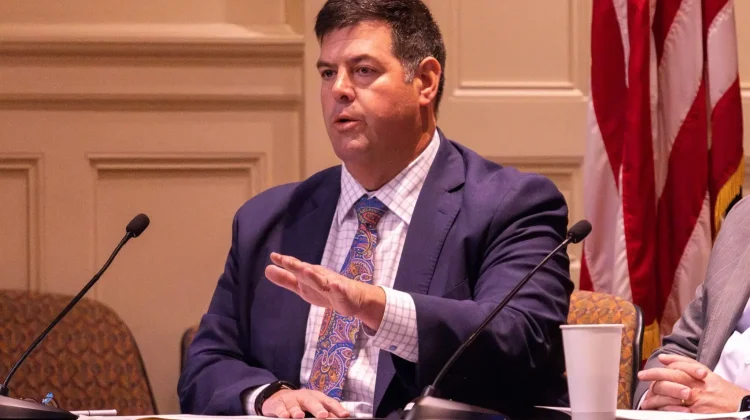BOSTON — Gov. Maura Healey officially appointed west Lynn native Steve Walsh to the Health Policy Commission (HPC) — a regulatory body charged with controlling health care costs and overseeing major decisions within the Massachusetts health care system, including matters directly tied to Walsh’s current clients.
Walsh, president of the Massachusetts Health and Hospital Association (MHA) since 2017 and former state representative, expressed gratitude and optimism as he steps into his new role.
“I am deeply grateful that the governor has asked me to serve on the Health Policy Commission, whose foundation and overall mission I had the privilege of helping create more than a decade ago,” Walsh said in a statement. “Massachusetts patients and providers are facing profound challenges that will likely intensify, but they are also part of a state that believes in collaborative problem solving, innovative public policy, and bold action to support the people at the heart of care delivery.”
He added, “That is exactly the type of progress the Health Policy Commission makes possible, and I look forward to helping shape a stronger healthcare system along with my fellow commissioners.”
Walsh’s appointment comes at a time of widespread concern over access, affordability, and quality in the state’s health care system. Yet, his selection has also intensified criticism from watchdogs and advocacy groups who say the move blurs ethical boundaries.
In the days leading up to the announcement, Beacon Hill was awash with speculation. Walsh’s dual role — as head of the powerful hospital lobbying group and now a regulator overseeing hospitals — has led some to call his appointment a conflict of interest.
“Steve Walsh’s appointment is a blatant conflict of interest and problematic to the employer community,” said Eileen McAnneny, president of the Employer Coalition on Health. “I hope the governor rethinks the decision in light of these concerns.”
Walsh has taken steps to comply with ethics rules. He filed a formal disclosure under Section 23(b)(3), outlining that MHA members — including hospitals and provider organizations — pay dues to support his advocacy efforts. Walsh said he would be “internally walled off” from MHA business expected to come before the HPC and will recuse himself from commission votes involving performance improvement plans, hospital expansions, and cost-related transactions tied to MHA members.
“Hopefully, the disclosure that I filed will alleviate some of those concerns,” Walsh said in an interview. “We have an opportunity right now to shape the future of health care and make a system that’s more affordable and accessible.”
Walsh served in the Massachusetts House of Representatives for six terms, where he co-chaired the Health Care Financing Committee and helped shape the landmark 2012 cost-containment law that created the HPC. His return, more than a decade later, is a full-circle moment.
“At this point in my career, to return to try to perfect it in some way … is really exciting,” Walsh said.
Healey’s office defended the appointment, citing the 2024 law that restructured the HPC and mandates that one commissioner have direct experience representing hospitals.
“Steve Walsh is uniquely qualified to bring that expertise to the work of the HPC with his deep understanding of the current challenges facing hospitals, his work with 70 community hospitals across the state, and his experience as a legislator and policymaker,” said Healey spokesperson Karissa Hand.
Walsh is joined by five other appointees to the board: Chair Deborah Devaux (reappointed); Jamie Willmuth, senior policy analyst at 1199 SEIU; Sandra Cotterell, former CEO of Codman Square Health Center; Christopher Leibman, Biogen senior vice president; and Umesh Kurpad, former CFO of Point32Health, the parent of Tufts Health Plan and Harvard Pilgrim.
Walsh emphasized that most of the commission’s work isn’t about hospital mergers or cost hearings — it’s about long-term system design.
“The Health Policy Commission was created to really change the way our system delivers care, so that it works better for patients and for consumers,” he said. “Most of what the HPC does is not about transactions — it’s about how to build a better system that is in desperate need of reform.”
As the newly structured board takes shape, Walsh says he’s ready to contribute.
“This is a moment to be bold,” he said. “We have the chance to do things differently — and better — for the people of Massachusetts.”

